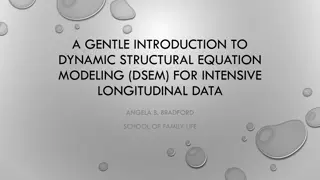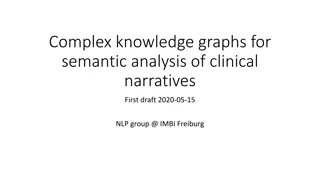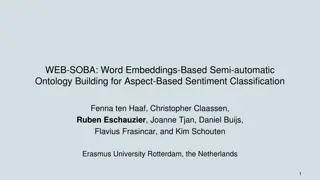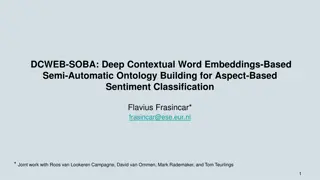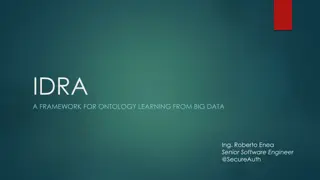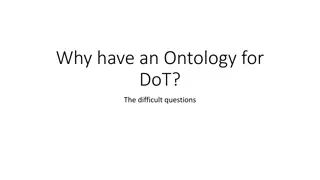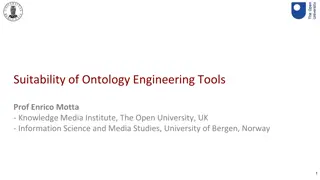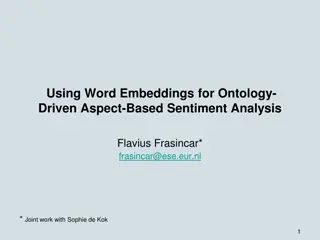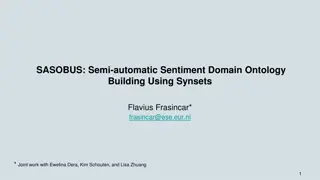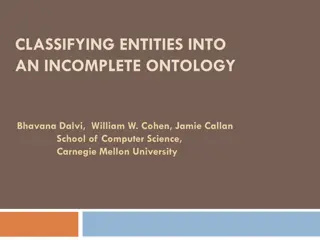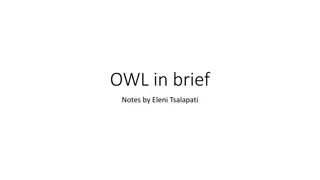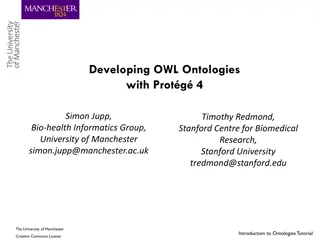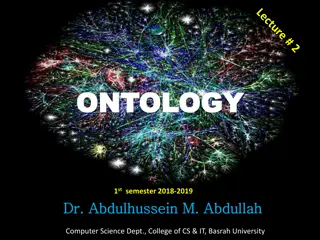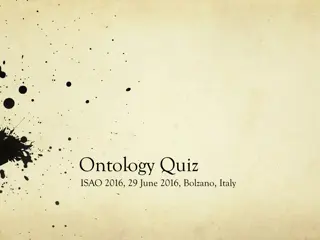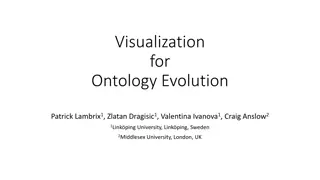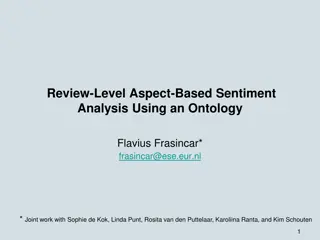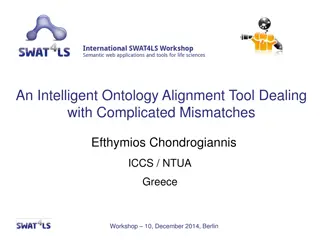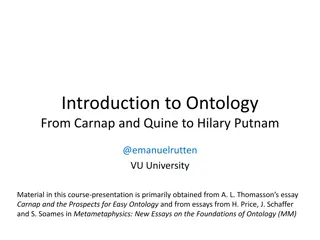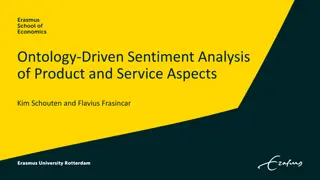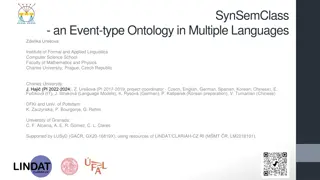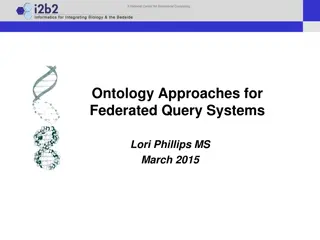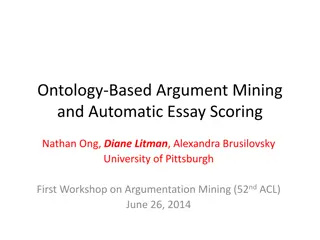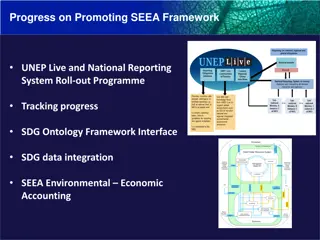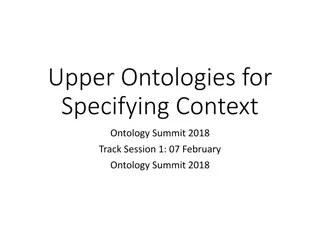Geometric Modeling in CAD
Geometric modeling in computer-aided design (CAD) is crucially done in three key ways: wireframe modeling, surface modeling, and solid modeling. Wireframe modeling represents objects by their edges, whereas surface modeling uses surfaces, vertices, and edges to construct components like a box. Each
3 views • 37 slides
Introduction to Dynamic Structural Equation Modeling for Intensive Longitudinal Data
Dynamic Structural Equation Modeling (DSEM) is a powerful analytical tool used to analyze intensive longitudinal data, combining multilevel modeling, time series modeling, structural equation modeling, and time-varying effects modeling. By modeling correlations and changes over time at both individu
6 views • 22 slides
Semantic Analysis of Clinical Narratives Using Complex Knowledge Graphs
Need for improved semantic analysis of clinical narratives for information retrieval and decision support is addressed through the use of complex knowledge graphs. These graphs capture axiomatic descriptions of generalizable truths about entities in the medical domain, providing a language-independe
0 views • 8 slides
WEB-SOBA: Ontology Building for Aspect-Based Sentiment Classification
This study introduces WEB-SOBA, a method for semi-automatically building ontologies using word embeddings for aspect-based sentiment analysis. With the growing importance of online reviews, the focus is on sentiment mining to extract insights from consumer feedback. The motivation behind the researc
3 views • 35 slides
Semi-Automatic Ontology Building for Aspect-Based Sentiment Classification
Growing importance of online reviews highlights the need for automation in sentiment mining. Aspect-Based Sentiment Analysis (ABSA) focuses on detecting sentiments expressed in product reviews, with a specific emphasis on sentence-level analysis. The proposed approach, Deep Contextual Word Embedding
5 views • 34 slides
CCSDS System Architecture WG Restart Summary
System Architecture Working Group (SAWG) is restarting to refresh the CCSDS Reference Architecture for CMC. The motivation stems from the need to update the outdated RASDS and align it with evolving standards and projects. The plan includes incorporating operational, physical, and service viewpoints
2 views • 9 slides
Framework for Ontology Learning from Big Data with IDRA
IDRA (Inductive Deductive Reasoning Architecture) presents a comprehensive framework for ontology learning, focusing on data modeling and architecture components. ETL (Extract Transform Load) processes play a vital role in semantic enhancement of data, especially in identity and access governance co
0 views • 25 slides
Importance of Ontology in System Development for DoT
Ontology plays a crucial role in the development of systems for DoT by facilitating the automation of tasks, improving consistency, and enhancing the efficiency of tool chains. It enables the transformation of semantic descriptions into algorithms, streamlining processes and reducing the need for ma
2 views • 7 slides
Challenges and Opportunities in Ontology Engineering Tools
Prof. Enrico Motta discusses the limitations of current ontology engineering tools, emphasizing the need for better support for creating ontological specifications. The lack of tools that offer a knowledge-level perspective and assist in sensemaking, navigation, and identifying relevant definitions
3 views • 5 slides
Using Word Embeddings for Ontology-Driven Aspect-Based Sentiment Analysis
Motivated by the increasing number of online product reviews, this research explores automation in sentiment mining through Aspect-Based Sentiment Analysis (ABSA). The focus is on sentiment detection for aspects at the review level, using a hybrid approach that combines ontology-based reasoning and
3 views • 26 slides
BabyDayOut Ontology: Describing Picture with Classes, Instances, and Relations
Ontology "BabyDayOut" is developed using RDF/RDFS to describe a picture. It includes classes such as Person, Animal, Baby, Picture, Man, and Gorilla with instances like John, KingKong, Jack, Peter, and Alex. Various relations like hasFriend, hasAnimalFriend, sonOf, depicts, hasEnemy, and hasTitle ar
1 views • 9 slides
SASOBUS: Semi-Automatic Sentiment Domain Ontology Building Using Synsets
Building on the need for automation due to the increasing volume and significance of online reviews, SASOBUS focuses on Aspect-Based Sentiment Analysis (ABSA). The motivation behind SASOBUS lies in the growth of sentiment mining for product reviews, particularly at the sentence level. Its approach i
3 views • 36 slides
Classifying Entities into an Incomplete Ontology: Exploratory EM Approach
The research discusses methods for hierarchical classification of entities into incomplete ontologies. It explores the challenges of evolving web-scale datasets and the need for classifying entities in an incomplete ontology structure. The Hierarchical Exploratory EM model is detailed, providing ins
5 views • 27 slides
Web Ontology Language (OWL) in a Nutshell
Web Ontology Language (OWL) is a powerful tool for ontology modeling, allowing the creation of complex structures and relationships. OWL encompasses entities, expressions, and properties, enabling detailed descriptions of domains through axioms. The language supports both object and data properties,
2 views • 39 slides
Introduction to Developing OWL Ontologies with Protégé 4
Explore the world of developing OWL ontologies with Protégé 4 through a comprehensive tutorial by Simon Jupp and Timothy Redmond from Stanford Centre for Biomedical Research and the University of Manchester. Learn about OWL introduction, Protégé 4 interface, compositional approach, and the signi
2 views • 44 slides
Introduction to Ontology in Computer Science
Ontology is the study of existence, with applications in various fields like philosophy, linguistics, and computer science. In computer science, an ontology is an engineering artifact that defines a specific vocabulary to describe a domain, along with explicit assumptions about the vocabulary's inte
1 views • 33 slides
Ontology Quiz: Test Your Knowledge on Computational Logic and Philosophy
Delve into the world of ontology with this quiz featuring questions on computational complexity, mereology, standardization of OWL, and foundational ontologies. Test your understanding on topics such as first-order predicate logic, parthood in mereology, and more. Challenge yourself and expand your
4 views • 45 slides
Visualizing Ontology Evolution for Improved Knowledge Management
Ontologies are dynamic entities that evolve over time, impacting semantically-enabled applications and knowledge acquisition. This work focuses on identifying desired functionalities for ontology evolution systems, highlighting the steps involved in ontology evolution, and emphasizing the importance
0 views • 16 slides
Semantic Tool for Personal Information Protection
Semantic Tool for the Protection of Personal Information Act is a project led by Yahlieel Jafta, aiming to establish a knowledge base using ontology to assist individuals and organizations in interpreting the Act. The project focuses on the importance of ontologies in extending knowledge and enablin
0 views • 17 slides
Ontology-Driven Review-Level Aspect-Based Sentiment Analysis
This study presents an innovative approach to sentiment analysis at the review level, focusing on aspect-based sentiment analysis (ABSA) using ontologies. Motivated by the increasing volume of product reviews online, the research addresses the challenge of detecting sentiment associated with aspects
2 views • 30 slides
Comprehensive Guide to Ontology Editors and IDEs for Ontologies
Explore a wide range of Ontology Editors and Integrated Development Environments (IDEs) for managing ontologies efficiently. From simple text editors to advanced IDEs like Protégé and Web Protege, learn about various tools and syntax options available. Dive into Ontology Editors like Protégé 4.3
3 views • 16 slides
Advancing Digital Preservation Through Risk Assessment and Ontology
Explore the innovative approach of utilizing risk assessment methodologies and ontology to enhance digital preservation strategies. Learn how these tools help in identifying risks, mapping mitigation measures, and aligning real-world objectives with preservation goals for effective management of dig
2 views • 11 slides
Intelligent Ontology Alignment Tool for Complex Mismatches
Dealing with ontology mismatches is crucial in aligning diverse healthcare entities and data sources. Learn about an intelligent ontology alignment tool presented at the ICCS/NTUA workshop in December 2014 in Berlin, focusing on managing conceptual, explication, and classification mismatches using m
0 views • 18 slides
Introduction to Ontology
The evolution of ontology from Carnap's logical positivism to Quine's revival of metaphysics, reshaping the landscape of analytic philosophy. Quine's method for serious ontology challenges traditional views on existence, incorporating scientific theory and logical analysis to explore the nature of r
3 views • 16 slides
Ontology Editor and OWL Syntax Exploration
Delve into the world of ontology editing and OWL syntax with the Protégé Ontology Editor, along with essential reading materials for building OWL ontologies. Discover tools for integrating reasoning and ensuring consistency in your ontologies. Learn about Manchester DL syntax and its user-friendly
10 views • 7 slides
Ontology-Driven Sentiment Analysis for Product and Service Aspects
Sentiment analysis through ontology to determine positive, negative, or neutral sentiments for different aspects of entities. Utilizing ontology for sentiment inference yields explainable results but requires a comprehensive ontology. The purpose is to link lexicalizations to aspect and sentiment co
2 views • 24 slides
SynSemClass - an Event-type Ontology in Multiple Languages
An innovative study on an event-type ontology presented in multiple languages by Zdeka Ureov at Charles University, Prague. This research originates from the Institute of Formal and Applied Linguistics within the Computer Science School. The paper delves into the classification of events with lingui
0 views • 16 slides
Approaches for Federated Query Systems and Ontology Mapping
This content delves into the methodologies, tools, and strategies involved in federated query systems, specifically focusing on ontology mapping, query construction, and types of queries within the i2b2 Star Schema. It discusses the necessity of integrating local codes into central hierarchies and p
3 views • 26 slides
Integrating Ontology Debugging and Matching into Methodology
Most ontology engineering methodologies lack detailed quality assurance steps, leading to issues in ontologies. Ontology Design Patterns can help reduce quality issues in the design stage. eXtreme Design (XD) is a methodology based on ODPs, but additional solutions like ontology matching and debuggi
0 views • 18 slides
Ontology-Based Argument Mining and Automatic Essay Scoring
This research explores the use of ontology-based argument mining and automatic essay scoring to enhance the evaluation process for argumentative essays. By leveraging diagram ontology elements and rule-based algorithms, the system can identify key components like claims, hypotheses, supports, and op
1 views • 17 slides
Introduction to Ontology and IDEs for Ontologies
Ontology is a detailed study of the nature of existence or reality, often represented in structured formats for various applications. Explore different Integrated Development Environments (IDEs) tailored for working with ontologies, from simple text editors to more advanced tools like Protégé and
2 views • 53 slides
Anatomy Track in Ontology Alignment Evaluation Initiative
Explore experiences and insights from the Anatomy track in the Ontology Alignment Evaluation Initiative, focusing on overlapping ontologies, data integration, agent communication, and bottom-up ontology development for improved alignment. Learn about the initiative's goals, evaluation methods, parti
0 views • 37 slides
Progress on Promoting SEEA Framework and SDG Ontology Integration
Explore the progress made in promoting the System of Environmental-Economic Accounting (SEEA) framework and integrating it with the Sustainable Development Goals (SDG) Ontology. This program tracks advancements in environmental-economic accounting, data flows, ecosystem impacts, and more to enhance
2 views • 4 slides
Discrete Event Modeling vs. Agent-Based Modeling: A Comparative Analysis
Explore the differences between discrete event modeling and agent-based modeling in this informative presentation. Discover how these modeling approaches vary in defining system behavior, individual autonomy, and global outcomes, with real-world examples and accompanying research paper. Understand t
4 views • 8 slides
Ontology Summit 2018: Upper Ontologies for Specifying Context Track Session
Explore the objective of the Ontology Summit 2018 track focusing on upper ontologies for context specification. Delve into the role of upper ontologies in defining context and understanding context partitions, all within the realm of ontology usage. Discover the significance of formalizing meaning w
1 views • 18 slides
Ontology Editors, IDEs, and Syntax: Tools for Effective Ontology Development
Explore ontology editors, Integrated Development Environments (IDEs), and syntax options for efficient ontology creation, such as Protege, Web Protege, Manchester OWL Syntax, and data values and datatypes. Learn about popular tools, features, and best practices for managing ontologies effectively.
0 views • 16 slides
Understanding Ontology in Social Sciences and Philosophy
Explore the concepts of ontology in social sciences and philosophy, focusing on the nature of existence and reality as discussed by prominent figures like Parmenides. Learn how ontology influences the study of administration and human relationships within organizations.
5 views • 18 slides
Semantic Tool for Personal Information Protection: Ontology Implementation
Explore the use of semantic tool and ontology to safeguard personal information in compliance with data protection regulations. Discover successful ontology implementations and related work such as GDPR and PrOnto Ontology.
1 views • 18 slides
Understanding Ontology in Knowledge Representation
Explore the concept of ontology as a specification of conceptualization, describing the key elements, relationships, and purpose for knowledge sharing among agents. Ontology bridges philosophy to AI, defining existent entities and relationships within a domain to enable effective communication and k
1 views • 8 slides
Understanding Semantic Web Technologies and Ontology Editors
Explore the world of Semantic Web Technologies and Ontology Editors through tools like Protégé, delve into Manchester DL Syntax, and essential readings on OWL Ontologies. Learn to build an ontology for describing pizzas with specific characteristics.
0 views • 7 slides

